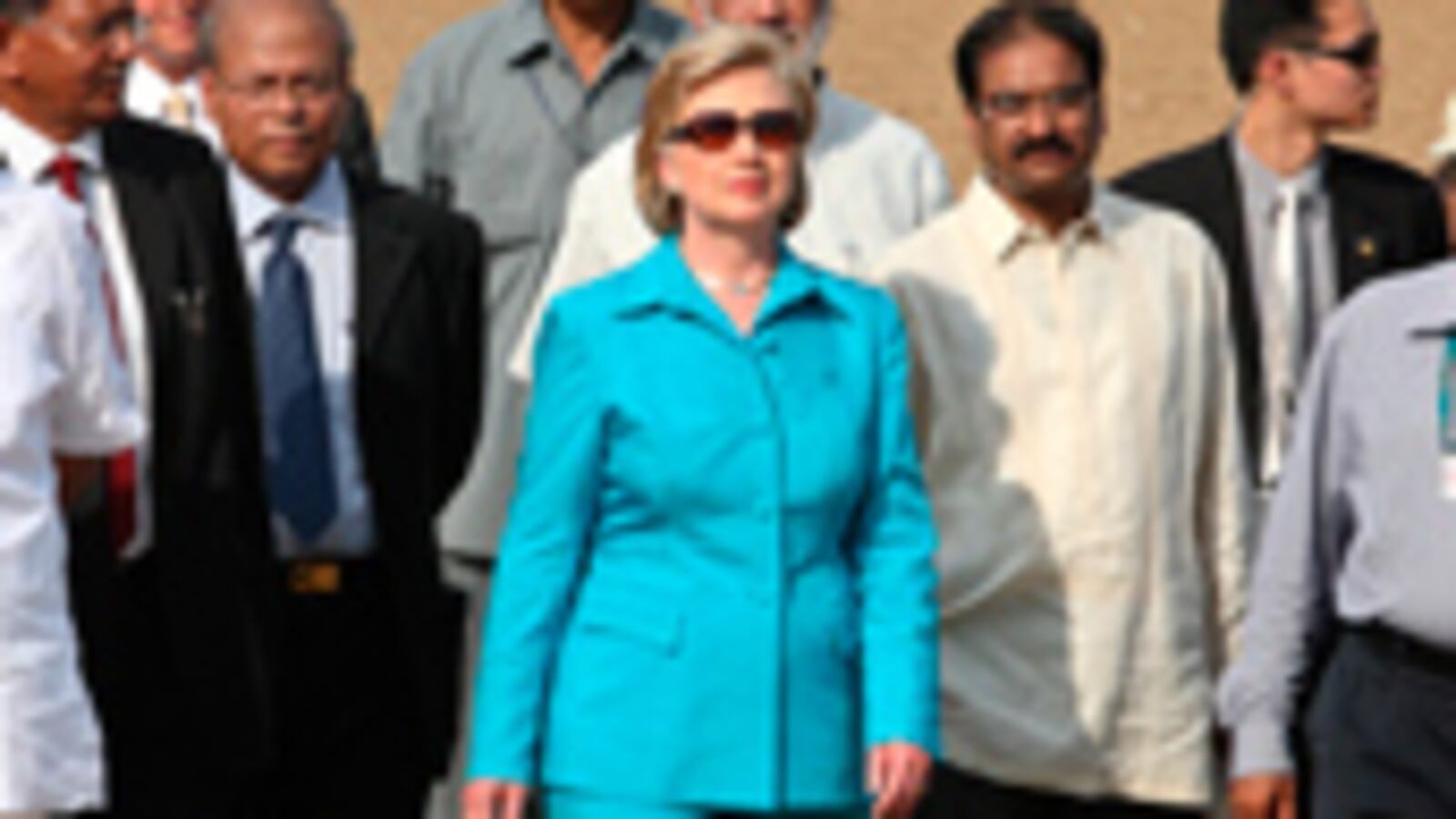
Terrorism, the recession, rogue states, Taliban threats, dissent on global warming—not to mention a fractured elbow and all the spicy food. Reihan Salam on the real challenges of Clinton's trip to Asia.
There's something very poignant about the photographs of a beaming Hillary Clinton in India. Having fractured her elbow last month, the secretary of State has been undergoing a grueling regime of physical therapy, and until recently she was wearing a stylish sling. One has to assume that Clinton is still in pain, yet she's managed to put on a valiant show for the Indian throngs who've greeted her. When Clinton first visited India in 1995, she was festooned with garlands at every stop. As a country with its own tradition of formidable female leadership, the first lady struck a chord with the Indian masses. Indeed, the massive success of that visit may have contributed to the sense that Clinton could enter the international fray in her own right. This time, however, the Indian throngs haven't been entirely pleased with Clinton.
For all their Americaphilia, Indians consider the enormous sums the U.S. sends to Pakistan to fight Islamist terrorism to be something between a cruel joke and a slap in the face.
For most Americans, India is a country shrouded in mystery, full of bearded swamis, snake-charming tricksters, and software-designing geniuses who spend all their waking hours plotting how to steal U.S. jobs. But in a dramatic turnaround from the not-so-distant 1980s, when India was a staunch ally of the USSR and the burning of American flags was the country's second most popular source of warmth after the sun, Indians are terribly fond of America. They are so besotted, in fact, that a majority of Indians adored George W. Bush, whose appeal didn't travel well as a general rule, as a rare terrorist-crushing statesman with the guts to take on radical Islam. It helps that India, like the United States, has been on the receiving end of Islamist terrorism for years, most spectacularly during last year's terrifying assault on the commercial heart of Mumbai, India's biggest city. Clinton gave a moving tribute to the victims of the attack just as news reports of a new attack in Indonesia continued to unfold. Interestingly, India's experience with terrorism has led to a slight wrinkle in the ever-expanding embrace between the world's two largest democracies. While the rest of the world has celebrated the Obama White House and its soothingly diplomatic tones with wild enthusiasm, India has been slightly wary, sensing that the new administration's emphasis on sleeping with erstwhile enemies reflects a distinctively American ingenuousness.
During the transition, for example, there was a lot of noise from the Obama camp about how the solution to the unfolding crisis in Pakistan and Afghanistan was a comprehensive settlement of the Kashmir dispute that has kept India and Pakistan inches away from mutual annihilation for years. The logic is impeccable. The Pakistani military has been reluctant to draw its forces from the Indian border to the fight against vastly more dangerous radical jihadists. In theory, a Kashmir settlement could give the Pakistanis the confidence to focus their immense military resources, bought and paid for by the American taxpayer incidentally, on a truly potent threat. The glaring deficiency in this neat view is that Pakistan and India aren't interested. Kashmir is, for both states, an existential question: Pakistanis see the region as an excised part of their Muslim homeland, while Indians see it as living proof of their country's secular ideals. Imagine if an overstuffed British diplomat took Abraham Lincoln aside to say, "Now, let's be sensible about this Confederacy business, old man."
Among Indians, the near-consensus view is that Pakistan is a rogue state in all but name, one that has sponsored anti-Indian terrorism for decades. And for all their Americaphilia, Indians consider the enormous sums the U.S. sends to Pakistan to fight Islamist terrorism to be something between a cruel joke and a slap in the face. One often gets the impression that Pakistan considers Indian consulates in Afghanistan to be a greater threat than the Taliban itself, so this view is not entirely unreasonable. Yet part of Clinton's mission to India is to convey the seriousness of the American effort in Afghanistan: as Bruce Riedel has explained in The Daily Beast, the Taliban is intends to outlast Obama's Afghanistan surge by raising U.S. casualties to unacceptable levels and forcing withdrawal. If that does indeed come to pass, India will have to contend with an unending wave of terrorist threats emanating from Talibanistan.
Having run for president on a platform of jobs, jobs, and more jobs, Clinton has also met with Indian billionaires and officials in an effort to drum up demand for American products and services. It helps that the U.S.-India economic relationship rests on ties of warmth and affection: of the billionaires at Clinton's breakfast in Mumbai, a large number spent formative years in the United States as students. And though India has made tremendous strides over the last decade and a half, its leaders have no illusion that they're about to displace America as an economic superpower, whereas the Chinese have grown steadily more assertive. If anything, America's leadership class is cheering India on as a potential counterbalance to Chinese power while Indians see America as a vital partner, one that's been more than willing to purchase cheap outsourced business services.
Things did get a bit dicey when the secretary of State delicately danced around the Obama administration's differences with India over climate change. Jairam Ramesh, India's environment minister, rather indecorously groaned about U.S. insistence that his developing country enter a global agreement on curbing carbon emissions. The classic, and correct, Indian argument on the issue is that it is the rich countries that have benefited the most from spitting carbon emissions into the atmosphere over the last 200 years, and so it is the rich countries who should do something about it. Crippling economic growth now through onerous regulations would be a serious blow to India's poverty-stricken majority. The U.S. recognizes, however, that a leaky international agreement, in which polluters can simply set up shop in India or China to avoid tough regulations, might devastate its manufacturing base. To her credit, Clinton tried to split the difference by arguing that India could actually fuel its economy by adopting clean and efficient technologies. But is one area where U.S.-India differences are likely to remain sharp.
Clinton's Asia trip continues in Thailand this week, where she'll meet foreign ministers from throughout Southeast Asia to discuss the global economic meltdown, terrorism, and coups, all while eating spicy food. I don't envy her.
Reihan Salam is a fellow at the New America Foundation and the co-author of Grand New Party.






